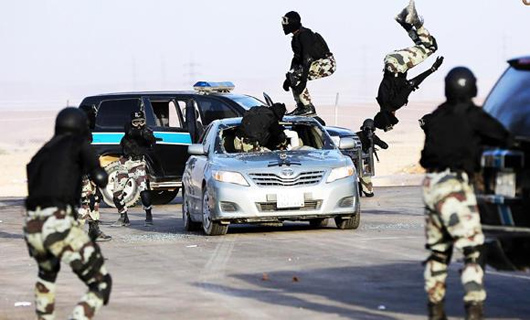Jeddah, May 7: Five men including an officer were killed and 12 injured by mortar shells launched from the Yemeni side of the border on Wednesday, the Civil Defense announced.

Captain of a jail patrol Cpl. Hyyan Al-Wadie was killed when a shell hit him in King Salman Street at 1:30 p.m., said a spokesman of the Civil Defense in Najran. His companion was wounded and rushed to a nearby hospital.
The other fatalities were two passengers in a civilian car, a worker in a tire shop, and a person walking in the street. Eleven other people who were injured were taken to a local hospital, the spokesman said.
The attacks followed mortar fire late on Tuesday night on Jazan that saw a man and his wife killed and their relative severely injured in the border village of Al-Bahteet.
Maj. Yahya Abdullah Al-Qahtani, spokesman of the Civil Defense in Jazan, said reaction teams received a report at 11:45 p.m. indicating a housing complex in Al-Bahteet village was hit. He confirmed that two people had been killed and a third seriously injured.
He said two other people at the site with breathing problems and minor injuries were taken to a hospital for treatment. Al-Qahtani said a committee at the headquarters of the Civil Defense in Jazan has been tasked with monitoring the situation and taking steps to protect citizens.
Meanwhile, according to reports, mortar shells and Katyusha missiles launched by the Houthis damaged several schools, homes, shopping centers, cars and a field hospital in Najran on Tuesday.
Three students from a school in Al-Mokhayam district were injured in the attacks but all are in a stable condition. One student had to undergo surgery to remove shrapnel from her back.
Despite the damage, residents said they are confident that the Saudi Army, whose morale is high, would protect them against these attacks. Many said the Houthis were “desperate” because their camps and weapon stores had been destroyed by the coalition forces.
Brig. Gen. Ali bin Mohammed Al-Omari, head of the Civil Defense in Najran, said the city was safe and no evacuation of villages and neighborhoods was necessary at this stage.
Meanwhile, Crown Prince Mohammed bin Naif, deputy premier and minister of interior, launched a joint exercise of special security forces. During the exercise in Dhurma, 74 km northwest of Riyadh, the forces displayed their tactical fighting skills. Anti-terrorism forces and emergency security forces also took part in the exercise, which reflects the Kingdom’s preparedness to counter enemy attacks.
Also on Wednesday, Deputy Crown Prince Mohammed bin Salman, second deputy premier and minister of defense, visited the Air Force Operation Center in Riyadh to monitor progress of airstrikes carried out by the Saudi-led alliance during the past 24 hours. He also discussed with air force commanders the operation plan for the next 24 hours and logistical support required for the campaign.






Comments
Add new comment